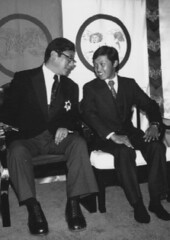One day, when Osel Rangdrol was a boy -- when he was still Osel Rangdrol -- his father called him over. "Come here," he said. The boy, who was around 10 then, hesitated, expecting that he would be drilled on homework or assigned work to do. "Come here," his father said again, with no hint of what would be asked.
The boy waited, then gave in to the inevitable and walked to his father's side.

"Let's just be," his father said.
Just be? the boy wondered, accustomed to being instructed. But there were no more instructions, just a boy and his dad sitting together with no tests, no pressure, just a moment.
Sakyong Mipham Rinpoche told that story at the Being Brave Shambhala Sangha Retreat at Karme Choling. He was the boy; his father was the venerable Buddhist teacher Chogyam Trungpa Rinpoche, founder of the Shambhala Buddhist lineage.
The Sakyong gave many teachings during the five-day retreat, but I was especially touched by this one -- which he described as his first transmission from his father. He's received many more complicated transmissions, he said, but none more profound.
(The photo shows Chogyam Trungpa and Sakyong Mipham, date uncertain.)
Perhaps this struck me as particularly poignant because I think a lot of us received similar transmissions. I know I did. My dad used to sit on the front porch on summer evenings, smoking cigarettes and observing the world. Being. Sometimes my grandfather, who lived upstairs in the house where we lived downstairs, would join him. Maybe they'd talk politics or baseball. But the talk wasn't the point. Being was.
The neighborhood kids were part of the passing scene, rolling back and forth with the flow of our games. When the streetlights came on and we headed home, he would just be there.
Often on summer evenings, as the light begins to change, as the heat sinks into the asphalt, I wander out onto my front steps. My hands ache for the ritual of taking a cigarette from a pack, lighting it, and watching the smoke and the day dissipate. I don't smoke; my dad died from cancer that showed up first in his lungs -- I recognize the longing for what it is.
I sit, sometimes on the porch steps, more often on my cushion upstairs. The quality of light changes. The day dims.
Let's just be.

